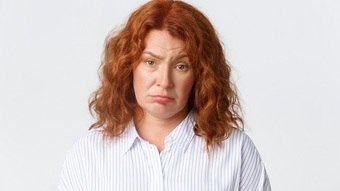Scientists in Denmark have found another reason to question hormone replacement in postmenopausal women.
According to a study published this Tuesday (1), in the Journal of the American Medical Association’s JAMA Network, the use of treatments to compensate for hormonal losses in this period may be associated with an increased risk of depression.
Throughout life, the female body undergoes numerous hormonal changes. These changes are generally identified as the main causes of frequent problems among women, such as depression and migraines.
The age of age, which usually occurs between 45 and 55 years, is characterized by a decrease in the production of progesterone and estrogen, the two hormones produced in the ovaries.
Therefore, 60% to 70% of women experience climacteric symptoms, which include mood swings, tachycardia, and overheating.
To avoid discomfort, many doctors recommend hormonal replacements. However, this method is in question, as it may increase the risk of cancer and thromboembolic events such as heart attack and stroke – and now it may also be linked to depression.
Based on data from the Danish Public Health System, the researchers analyzed all women who were 45 years old between January 1, 1995 and December 31, 2017, as long as they had not had their ovaries removed or had cancer, either of the reproductive organs or not.
825,238 volunteers were followed up to December 31, 2018. Prescriptions for estrogen-only replacement or estrogen plus progesterone, oral or transdermal ointment and local (intravaginal or intrauterine) were analyzed.
The diagnosis of depression was established in the Danish Central Register of Psychiatric Research and the Danish National Patient Register between 1995 and 2018.
During the period analyzed, a total of 189,821 women started hormone therapy (23%) and 13,069 (1.6%) were hospitalized for depression, representing an incidence of 17.3 cases per 10,000 person-years.
Women who used systemic hormone therapy before age 50 were more likely to develop depression later. The risk was particularly high in the year that treatment with both estrogen alone and estrogen combined with progestin – a synthetic compound with effects similar to those of progesterone – was started.
In situ replacement was not associated with risk of depression. However, the chances that the use of synthetic hormones will interfere with mental health are lower if the replacement is started after the age of 54.
“These results indicate that TH [terapia hormonal] Systemic administration before and during menopause is associated with an increased risk of depression, especially in the years immediately following its onset. While locally administered HT is associated with a lower risk of depression in women aged 54 and over,” the authors wrote in the publication.
The researchers admit that the study has some limitations. However, “Self-analysis showed that the rate of depression was lower, especially before HT was prescribed, which may indicate that GPs are less likely to prescribe HT to women at risk for depression. On the other hand, clinicians prescribing alternative therapy need to be more attentive to the appearance of depressive symptoms among patients who were prescribed chemotherapy, and this may lead to detection bias.”
Here are seven tips for aging healthy and living longer

“Writer. Analyst. Avid travel maven. Devoted twitter guru. Unapologetic pop culture expert. General zombie enthusiast.”

